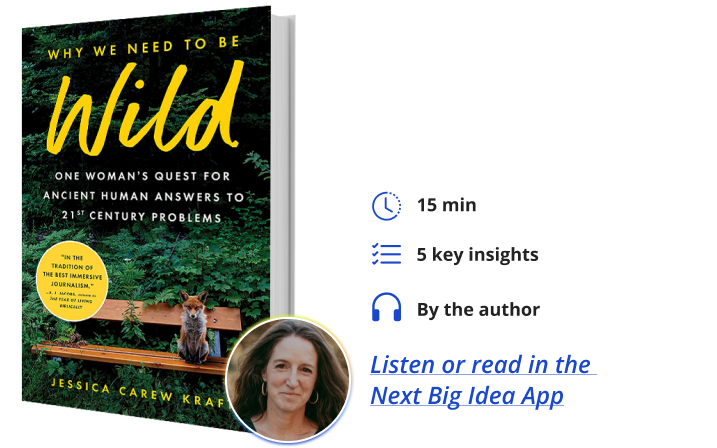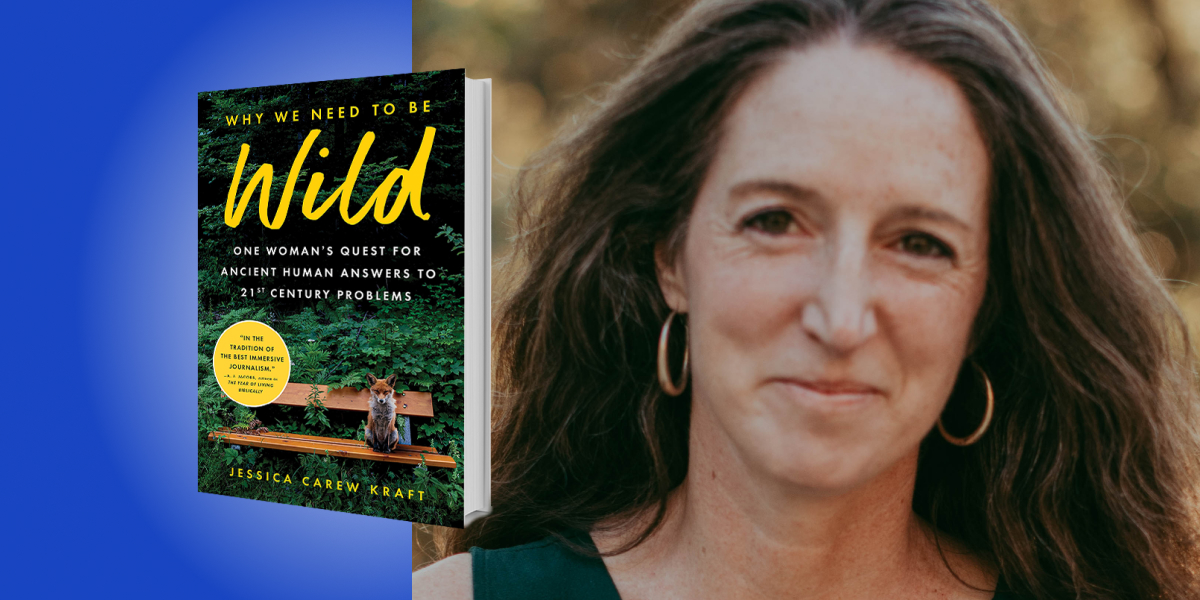Jessica Carew Kraft is a mother of two girls, a journalist, and an editor with a background in anthropology. In mid-life, she left a position advising tech startups to become a naturalist and wild food forager. She spent several years researching people and communities who practice the skills of ancient humans. Her writing has been published in the New York Times, The Atlantic, Forbes, and NBC News online, among other media outlets.
Below, Jessica shares 5 key insights from her new book, Why We Need to Be Wild: One Woman’s Quest for Ancient Human Answers to 21st Century Problems. Listen to the audio version—read by Jessica herself—in the Next Big Idea App.

1. Question the benefits of modern technology.
Several years ago, I was working as an editorial advisor to high-tech startups. I was like any other resident of San Francisco during the tech boom, relying on food delivery apps and summoning GPS-guided rides around the city, constantly attached to my cell phone. My daily routines were hectic and stressful, but I listened to the utopian tech CEOs and got excited about a future where the monotonous tasks of traditional family life could be eradicated with the push of a button.
Yet digital utopia seemed to get further and further away, and I wasn’t seeing many benefits in my life. In fact, I was miserable. The quality time I could allot to my family and friends was shrinking as I dashed around dealing with strangers, answering to a boss, and sitting inside for eight hours a day, mindful of always appearing productive to my coworkers. All of this seemed to go against my instincts to direct my own activities, be with my loved ones, and get outside.
Beyond my personal experience, most statistical indicators of physical, mental, and community health across the industrialized world were getting worse. Too many of us are overweight, sleep-deprived, stressed, isolated, depressed, anxious, diseased, addicted, and unable to pay attention. We spend 95 percent of our time indoors and don’t engage the natural world. I started asking myself if the benefits of this technological lifestyle were worth the cost, and that question opened a whole new world.
2. The lifestyle of our ancient ancestors and modern-day hunter-gatherers is healthier and happier than ours.
Studying field reports from anthropologists working with hunter-gatherer clans, I realized that we have traded away the social, psychological, and physical benefits of our ancestral lifestyle in favor of convenience, comfort, and technological progress.
True, we now enjoy easy access to calories, clean water, climate-controlled shelter, health care, and entertainment. But compared to hunter-gatherers, most of us don’t have adequate leisure time, healthy social support, or a purposeful sense of belonging.
“We have traded away the social, psychological, and physical benefits of our ancestral lifestyle in favor of convenience, comfort, and technological progress.”
The types of stressors we experience are ones that our ancient ancestors never knew because they didn’t have to work so hard—no more than three to six hours a day. An entire band cooperated to find and prepare food. All other materials for daily life came free from the environment. Living in tight-knit social groups provided them with security and emotional well-being.
Contrary to stereotypes, these cultures, which have persisted to this day, hold a deep respect for the role women and non-binary folks play in group life, and they are compassionate to the ill and disabled. Across the globe, hunter-gatherer groups persist, though they are constantly imperiled by farming, industry, and military incursion.
I know, it sounds absurd to recreate a primal lifestyle in modern society. I like my Netflix and Boba tea, too. Yet I spent the last five years learning from folks doing just that, realizing that these skills are crucial to human survival, beneficial for our health and families, and pretty badass.
3. Practicing rewilding reconnects us to our birthright as happy, healthy hominids in balance with nature.
We live in a state of evolutionary mismatch. We have domesticated ourselves and are utterly dependent on centralized production systems. Just as the dog, once a wild wolf, now expects its nightly kibble and soft bed, humans expect to get all their calories from the grocery store and snooze on a Tempur-Pedic mattress in a seventy-degree room.
Rewilding aims to bring us back into alignment with our ancestral ways of life. The popular Paleo diet is an attempt to rewild how we eat. Barefoot running shoes are meant to restore our original locomotion and get us in touch with the earth. Rewilders apply this logic to every aspect of life: how we sleep, socialize, work, make necessities, build shelter, raise children, and recreate. Some spend periods every year living in primitive shelters, sourcing their sustenance from nature, and occasionally returning to towns, jobs, cars, and coffee shops. Some keep a few durable industrial goods but carve out a feral life in the woods. Others roam the West in horseback caravans, harvesting and planting back wild species. I started meeting rewilders at gatherings teaching ancestral skills and attempted to learn what they knew.
I was fascinated by how they revived traditions that were on the brink of extinction. They were driven by the understanding that ancient human cultures were once profoundly egalitarian, never subjugating others or exploiting resources to the point of ruin. This allowed them to navigate issues of Indigenous rights, colonialism, and economic and racial privilege with great care. Despite the fact that living close to nature was once inherent to all humans, it has now become a privileged pursuit, often excluding minority groups and posing challenges for those struggling to make ends meet. Yet the allure of wilder life is something that all of us might still identify with.
4. Anyone, anywhere can rewild some parts of their life.
Rewilding means drawing inspiration from primal cultures, which possess the longest-standing wisdom traditions, to guide our way of life.
“Prioritize fostering meaningful relationships over pursuing wealth.”
Simplify your social circle to include only twenty-five—the group size our brains evolved to handle. Prioritize fostering meaningful relationships over pursuing wealth, because other people’s love and kindness are more reliable than the stock market. Incorporate wild foods into your diet. Encourage children to play outdoors and maximize time in nature. Instead of buying things, you can embrace the process of creation for your needs. Attempt to acquire a few ancestral skills, even if you only use them on camping trips. All of this will help reduce stress, promote activity, and even get that desirable dopamine detox.
The more I liberate myself from the confines of domestication, the happier I am. I’ve harvested roadkill for dinner, foraged wild greens for salads, carved knives from stone, and made clothing from deer hides. Doing all of this gave me more confidence in my ability to face whatever obstacles come my way.
5. Teaching children wild skills is essential.
A lot of us get anxious and upset about changing climate conditions and the increased scarcity of natural resources, thinking there is little we can do. But rewilding is something that even prominent scientists endorse. Writing in the journal Futures, economist John Gowdy foresees an eventual collapse of our civilization, due to how the projected rise in global average temperature will devastate agriculture. He wrote: “We became human as hunters and gatherers, and we can regain our humanity when we return to that way of life.”
Today, wilderness schools are teaching a critical mass of kids to master old ways and immerse in nature, which many believe is the key to ensuring human survival.
Throughout history, virtually all civilizations have collapsed, whether due to shifts in climate, environmental destruction, or the burden of their own complexity. In many cases, survivors relied on small groups and their prowess in the wild to thrive into future generations. Teaching children time-tested survival skills might be the most important thing we can do as a species. Even more importantly, it’s fun to rewild.
To listen to the audio version read by author Jessica Carew Kraft, download the Next Big Idea App today:































